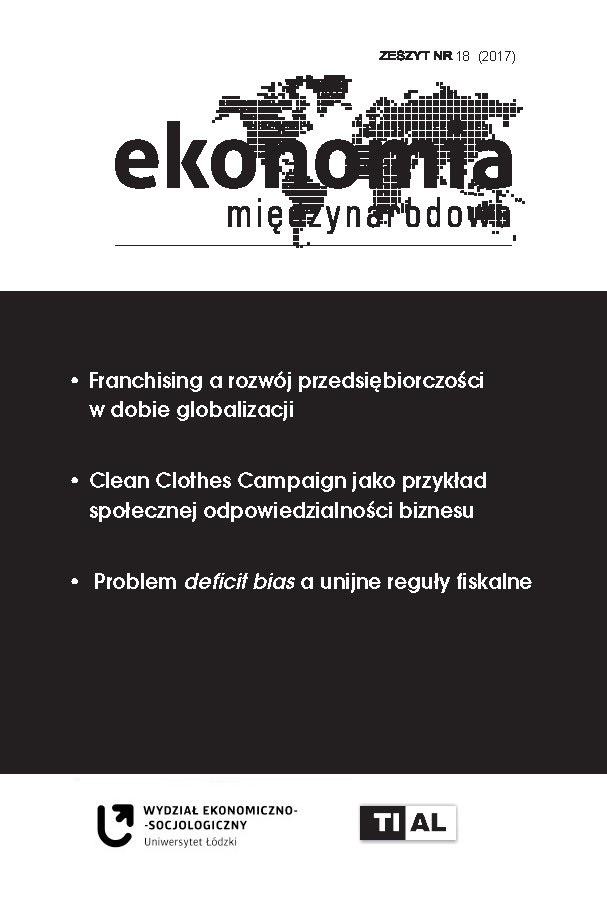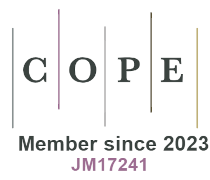Corporate Social Responsibility in the Garment Industry. The Case of the Clean Clothes Campaign and Developing States
DOI:
https://doi.org/10.18778/2082-4440.18.02Keywords:
Clean Clothes Campaign, Corporate Social Responsibility, developing statesAbstract
The aim of the article is to investigate the Clean Clothes Campaign (CCC) organization and its efforts to alleviate the poor situation of workers in developing states and to promote the idea of Corporate Social Responsibility. It starts with a brief example of two such developing countries, Bangladesh and Cambodia, data for which has been drawn from Eurostat, Trading Economics, and the CIA’s World Factbook. It then moves to its main focus, that is, the description of the structure of the CCC, the different ways in which it tries to achieve its goals, and the vast network of partnership between the campaign and NGO’s worldwide, as well as the cooperation with decisive bodies of the European Union. The article concludes that the work of the CCC is very important and is getting more and more recognition in recent years, both from formal bodies and the public.
References
Bangladesh Bureau of Statistics (2011), Report on Labour Force Survey 2010, http://203.112.218.66/WebTestApplication/userfiles/Image/Latest%20Statistics%20Release/LFS%20Report%202010.pdf (last accessed: 16 September 2016).
Google Scholar
Bangladesh Bureau of Statistics (2015), Population and Housing Census 2011, www.bbs.gov.bd/WebTestApplication/userfiles/Bangladesh_glance.pdf (last accessed: 16 September 2016).
Google Scholar
Carroll B. Archie (1999), Corporate Social Responsibility: Evolution of a Definitional Construct. “Business & Society”, Vol. 38, No. 3, September.
Google Scholar
DOI: https://doi.org/10.1177/000765039903800303
CIA The World Factbook (2016). Bangladesh,https://www.cia.gov/library/publications/the-world-factbook/geos/bg.html, (last accessed:16 September 2016).
Google Scholar
Clean Clothes Campaign (1998), Code of Labour Practices for the Apparel Industry Including Sportswear, www.cleanclothes.org/resources/publications/clean-clothes-campaign-model-code-of-conduct (last accessed: 16 September 2016).
Google Scholar
Clean Clothes Campaign (2004), Olympic Report, http://fairolympics.org/background/olympicreporteng.pdf (last accessed: 2 March 2017).
Google Scholar
Clean Clothes Campaign (2007), Clean Clothes Campaign letter to John Ruggie, https://business-humanrights.org/sites/default/files/media/bhr/files/Clean-Clothes-Campaign-letter-Ruggie-23-Mar-2007.pdf (last accessed: 7 March 2017).
Google Scholar
Clean Clothes Campaign (2010), International Forum Special, Threads, Clean Clothes Campaign Newsletter, 2010, No. 30, https://cleanclothes.org/resources/newsletters/ccc-newsletter-threads-no-30-international-forum (last accessed: 17 September 2016).
Google Scholar
Clean Clothes Campaign (2011), Annual report 2011, www.cleanclothes.org/about/annual-reports/2011-annual-report (last accessed: 2 March 2017).
Google Scholar
Clean Clothes Campaign (2014), Wage struggle continues, https://www.cleanclothes.org/ua/2014/cases/cambodia-wage-struggle (last accessed: 2 March 2017).
Google Scholar
Clean Clothes Campaign (2015a), Cases in Bangladesh, https://cleanclothes.org/ua/2014/maps/map-bangladesh (last accessed: 2 March 2017).
Google Scholar
Clean Clothes Campaign (2015b), Clean Clothes Campaign Contribution to the Informal meeting with stakeholders on responsible management of the supply chain in the garment sector – European Commission – 23rd January 2015 – Brussels, https://cleanclothes.org/img/pdf/ccc-contribution-flagship-initiative (last accessed: 2 March 2017).
Google Scholar
Clean Clothes Campaign (2015c), Chunji workers win right to organize at factory, https://cleanclothes.org/ua/2014/cases/chunji-knit (last accessed: 2 March 2017).
Google Scholar
Clean Clothes Campaign (2016), The principles of Clean Clothes Campaign’s work, www.cleanclothes.org/about/principles (last accessed: 2 March 2017).
Google Scholar
Clean Clothes Campaign (2017), Who we are, www.cleanclothes.org/about/whowe-are (last accessed: 17 June 2017).
Google Scholar
European Commission (2014), Informal Meeting with Member States on Responsible management of the supply chain in the garment sector, http://ec.europa.eu/transparency/regexpert/index.cfm?do=groupDetail.groupDetailDoc&id=16999&no=2 (last accessed: 1 March 2017).
Google Scholar
International Labour Organization (2015), Fundamental Conventions, www.ilo.org/wcmsp5/groups/public/@ed_norm/@declaration/documents/publication/wcms_095895.pdf (last accessed: 7 March 2017).
Google Scholar
National Institute of Statistics and International Labour Organization (2010), Labour and Social Trends in Cambodia 2010, www.ilo.org/wcmsp5/groups/public/---asia/---ro-bangkok/documents/publication/wcms_158511.pdf (last accessed: 2 March 2017).
Google Scholar
The Observatory of Economic Complexity (2016), Bangladesh, http://atlas.media.mit.edu/en/profile/country/bgd/ (last accessed: 2 March 2017).
Google Scholar
The Observatory of Economic Complexity (2016), Cambodia, http://atlas.media.mit.edu/en/profile/country/khm/ (last accessed: 2 March 2017).
Google Scholar
Trading Economics (2016), Bangladesh, www.tradingeconomics.com/-bangladesh/gdp-growth (last accessed: 2 March 2017).
Google Scholar
Trading Economics, Cambodia, www.tradingeconomics.com/cambodia/gdp (last accessed: 2 March 2017).
Google Scholar
US Department of State (2013), Bureau of Democracy, Human Rights and Labour, Bangladesh – Country Reports on Human Rights Practices for 2013, www.state.gov/documents/organization/220600.pdf (last accessed: 2 March 2017).
Google Scholar
Downloads
Published
How to Cite
Issue
Section
License

This work is licensed under a Creative Commons Attribution-NonCommercial-NoDerivatives 4.0 International License.









